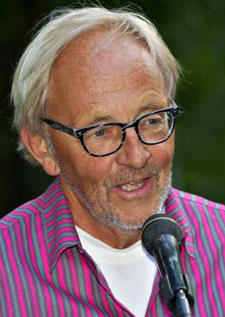Archive for June, 2016
The New Cold War – discussion at CCTV
On June 15, 2016 – Jan Oberg participated in a discussion on CCTV America – the global Chinese channel in the US with up to 75 million viewers – with Michael O’Hanlon of the Brookings Institution, a discussion lead by Anand Naidoo. See it here.
TFF PressInfo # 378: A new Cold War between Russia and the West?
By Jonathan Power
June 7th. 2016.
The second article in the TFF Series on The New Cold War
George Orwell, the author of “Animal Farm” and “1984”, was the first person to use the phrase “Cold War” in a 1945 newspaper article, written just after the nuclear bombing of Hiroshima and Nagasaki. He argued that “the surface of the earth is being parceled off into three great empires, each self-contained and cut off from contact with the outer world, and each ruled, under one disguise or another, by a self-elected oligarchy. He counted the US and Western Europe as one, the Soviet Union as the second and China as the third. He concluded that, “the atomic bomb is likeliest to put an end to large-scale wars at the cost of prolonging indefinitely a peace that is no peace”.
I think he got it nearly right – or so it seems as a new Cold War erupts between the West and Russia and China spars with the US over the South China Sea and its islands.
Of course it’s more complicated than that. China and Russia have a fair relationship. China and the US are perhaps doing nothing much more than annoying each other and the bonds of commerce and student exchanges bind both the elites and the populaces close together.
To me a new Cold War is nonsense on stilts. Even more than the original one.
George Kennan, the US former ambassador to Moscow and the author of how to contain the Soviet Union, always insisted that Stalin had no intention of rolling his tanks into Western Europe. As Robert Legvold summarizes Kennan’s views in his interesting new book, “Cold War”, “The threat the Soviet Union posed was political, a threat accentuated by these countries’ vulnerability to Soviet subversion because of their economic frailty and political instability – a threat requiring a political and economic response, not a military one”.
In 1948 Kennan wrote, as he observed the creation of Nato, “Why did they [Western leaders] wish to divert attention from a thoroughly justified and promising program of economic recovery by emphasizing a danger which did not actually exist but which might be brought into existence by too much discussion of the military balance and by the ostentatious stimulation of military rivalry?” Read the rest of this entry »
East Asia: Four formulas for peace
By Johan Galtung
Kyoto, Japan
An East Asia of 6 states, 5 from the 6-Party Talks + Taiwan. The 6 in East Asia divide into South Korea-Taiwan-Japan in the US-led alliance AMPO+ (USA-Japan Security Treaty+); North Korea; China-Russia with others in SCO (Shanghai Cooperation Organization). AMPO+ with US “nuclear umbrella”, the other two may acquire nukes; North Korea with nukes; and SCO with two nuclear powers. Put it all together: A nuclear arms race.
Arms races may deter, but often end with wars. Wars mean trauma for losers and glory for winners. PTSD – post trauma stress disorder – may lead to thirst for revenge, and PGED – post glory exuberance disorder – to thirst for more glory. War, war, war. Worse than ever since WWII.
East Asia badly needs another approach.
As a minimum, the four tasks in the TRANSCEND peace formula: the negative peace of conciling traumas and solving conflicts; the positive peace of cooperation for mutual and equal benefit-equity-and harmony based on empathy.
Unconciled traumas and unsolved conflicts:
Japan/USA over FDR provoking Japan into war, Pearl Harbor, fire-bombing/nuclear genocide (Obama fell far short of Willy Brandt genuflexing in Warsaw for the genocide on Jews); Japan/Russia over Russian expansionism and the war; Japan/Taiwan-Korea-parts of China for uninvited, not colonialism, but japanization; Japan/SK – a carbon copy of Japan – with hysterically anti-Japanese policies (not in Pyonyang) demanding ever more apology and money. But Japan-SK “comfort women”, like Japan-China Nanjing, are complex; international commissions may sort facts from fiction.
Japan/China slave labor seems solved (Japan Times 2 Jun 2016).
NK/USA-SK: normalization-nuclear free Korea vs NK collapse.
Then Japan vs Russia, Chinas, Koreas over the contested islands.
Then USA polarizing East Asia, more tension, micro-managing.
Most problematic: Japan, USA; least: Russia. Read the rest of this entry »
Comment on US implementation of Iran nuclear deal
June 10, 2016
Jan Oberg comments on why the US continues, soon a year later, to drag its feed. It’s lack of trust that still stands in the way.
TFF PressInfo # 377- Intro to a series: The New Cold War
By Farhang Jahanpour
The first article in a TFF Series on The New Cold War
There are many ominous signs that dark clouds are gathering over international relations, from the South China Sea, Taiwan, Vietnam, Japan and South Korea to the Middle East, and to Ukraine and the Baltics. We are entering a new and perhaps a more ominous Cold War.
This is something that will affect all our lives and will plunge us into a new era of East-West confrontation that none of us wants and that all of us should try hard to prevent.
Many young people were born after the end of the Cold War or were too young to remember its horrors, and how the world was on a knife’s edge about a possible global confrontation between the two superpowers with thousands of nuclear weapons whose use could have ended human civilization. We, who remember those days, should make sure that we do not see a repetition of that dark period in human history.
Yet, sadly, a Cold War mentality is once again creeping back into political discourse.
The Second World War that killed more than 60 million people and devastated many countries had hardly ended when new hostilities emerged. The dropping of the atomic bombs on Hiroshima and Nagasaki was not so much the final act in the Second World War as the opening shot in the Cold War. Contrary to the stated justifications for the dropping of the bombs as a means of forcing Japan to surrender, it is now clear that Japan was ready to surrender before the use of those awful weapons.
Many historians believe that the real reason for the use of nuclear weapons was to prevent Japan falling into the hands of the Soviet Union, as the Red Army was poised to take on Japan’s remaining army in Manchuria, thus forcing Japan to surrender to Russia. Furthermore, it was a clear signal of the West’s possession of the new devastating weapons.
For instance, the scientist Leo Szilard who met with US Secretary of State James F. Byrnes in May 1945, reported later: “Byrnes did not argue that it was necessary to use the bomb against the cities of Japan in order to win the war … Mr. Byrnes’ view was that our possessing and demonstrating the bomb would make Russia more manageable.” (1)
Therefore, far from wanting to save lives, the use of nuclear weapons was to demonstrate America’s overwhelming military might, and to issue a warning to Russia.
The war had hardly ended when in a speech in the British House of Commons on 16 August 1945 Winston Churchill referred to “the iron curtain which at the moment divides Europe in twain.”
It was in view of those ominous events that mankind decided to create international organizations that would “save succeeding generations from the scourge of war, which twice in our lifetime has brought untold sorrow to mankind.” The Charter of the United Nations aimed Read the rest of this entry »
Kärnvapen och andra vapen
Av Erni & Ola Friholt
Margot Wallström har utropat en feministisk utrikespolitik för Sverige. Inom den tecknades nyss ett värdlandsavtal med Nato, världens utan jämförelse starkaste militärallians. Avtalet permanentar flera gånger årligen återkommande militärmanövrer i stora delar av vårt lands luftrum, på landytan och i territorialvattnen. Sverige bekostar nödvändiga infrastrukturan-läggningar.
Militärmanövrerna samtrimmar svensk militär med Nato. Den underförstådda motståndaren är Ryssland, ständigt utpekat som aggressivt och hotfullt. Med den förklaringen flyttar Nato ständigt fram sina positioner mot Rysslands gränser. Eftersom Ryssland känner sig hotat utvecklas ett spel som leder till ökad spänning och krigsrisk, vilket i sin tur ger anledning att upprusta båda sidor.
Kapprustningen tar resurser från det civila samhället och skapar oro även där. Närmast ska det torkdrabbade Gotland utrustas med nya anläggningar, vapen och manskap. Kapprustning med ständigt nya vapen har bara ett slut: fattigdom och krig.
I denna situation önskar Sveriges regering förhandla fram ett förbud mot kärnvapen, det vapen som kärnvapenmakternas säkerhetstänkande ytterst vilar på och är det sista de skulle avstå från. Detta erinrar om myten om Sisyfos, mannen som dömts att baxa ett stenblock uppför en sluttning och som varje gång han nått toppen får se blocket rulla ner igen till utgångspunkten.
Den svenska regeringens feministiska Sisyfosarbete bortser ihärdigt ifrån att det är alla de andra vapnen som startar utarmande kapprustning och krigshot. De så kallade konventionella vapnen skördar dagligen och stundligen dödsoffer och skadade. Hur befängt det än kan låta, måste väl illusionen om säkerhet och fred genom de andra vapnen ha lockat till värdlandsavtalet med Nato?
Regeringen väljer att betala och samarbeta med ”de stora grabbarna”, de som i Serbien, Afghanistan, Irak, Libyen, Syrien, Jemen och Somalia med militära konventionella ”insatser” dödat över två miljoner människor på femton år och skadat ännu fler.
Deras svar på konflikter är endast ett: bombningar till underkastelse.
Därför får vi som svar ett evigt s k terrorhot.
Om den feministiska utrikespolitiken vore allvarligt menad, vore den givna politiken nedrustning, samtal och utbyte med den utpekade fienden, allt för avspänning i enlighet med Palmes kommission om gemensam säkerhet, alltså även motsidans säkerhet, och en verklig alliansfrihet.
Nu går färden åt motsatt håll, med kontraproduktiv handelsbojkott och anslutning till Natos våldsdoktrin.
Du lever farligt, Margot!
ERNI & OLA FRIHOLT
Nordic family meets with Big Brother Obama in his nice White House
By Gunnar Westberg
Very pleasant meeting. We all agreed on everything. We follow you, Big Brother, in all your ventures, we are so happy you like us.
Reports and family pictures have appeared in media from a dinner with 350 guests. Nice laudatory speeches, not a disturbing critical word.
There is a final document on everything that was agreed, already beforehand.
I recommend no one to read the paper, you can’t, it is such a soporific (= tending to induce drowsiness or sleep).
No journalist has so far given an overview, they fell asleep too, I guess. The section on Environment and on Energy seems good, but nothing new. The failure of the USA in energy conservation is not allowed to disturb in this Feel good report.
The section on Defence and Security is, however, very depressing. Read the rest of this entry »





